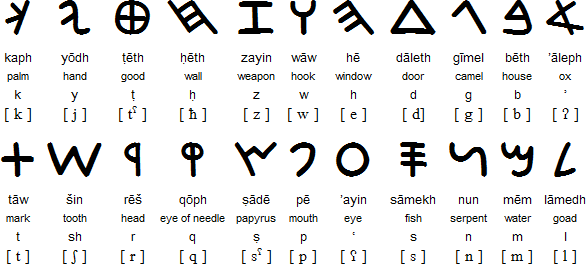Simplified History of English Orthography
Thousands of years ago the Phoenicians (modern day Lebanese) invented an alphabet that would conquer the Mediterranean from Egypt to Rome, and that would eventually become the English alphabet and the alphabet for much of the world.
Take a look at the original Phoenician letters below that became the foundation for global alphabets as disparate as Hebrew, Arabic, Greek, Russian, English and even modern day Chinese (Pinyin). Note how the letters embody the target sound e.g. "gimel," the word for camel, looked like a camel's hump and made the /g/ sound and ultimately became our "g;" "daleth," the word for door, looked like a door and made the /d/ sound and ultimately became the Greek "delta" and the Roman "d." "Mem," for water, looked like a series of waves, made the /m/ sound and ultimately became the Roman "m."
EVERY SINGLE Phoenician letter mnemonically embeded the target sound of their spoken language into the letter name.
As the alphabet moved around the Mediterranean and was absorbed by other languages, it was modified to incorporate more sounds that other languages used. So, for example, the Greeks added letters to the alphabet to accommodate their spoken language.
In an ideal world, when the alphabet finally reached the shores of England during the first Roman invasion of the first century A.D., still more letters would have been added to represent the 44 unique sounds of spoken English. Unfortunately, at the time, England was an unstable land, populated by a variety of Germanic tribes who had no interest in writing or codifying science, law, history or anything else. When the "Romans" returned one thousand years later via the Norman Conquest of 1066, the opportunity for modifying the alphabet was lost. The French speaking Normans simply imported the Roman alphabet and began spelling English words as best they could with the 26 letters that were available.
This led to a hodgepodge of variations in spelling as writers at the time attempted to codify English sounds using letter combinations such as ch, sh, gh, th, ph, ie, ei, ea, ee, ey, ou, oo, oa, oi, etc., etc., etc.

